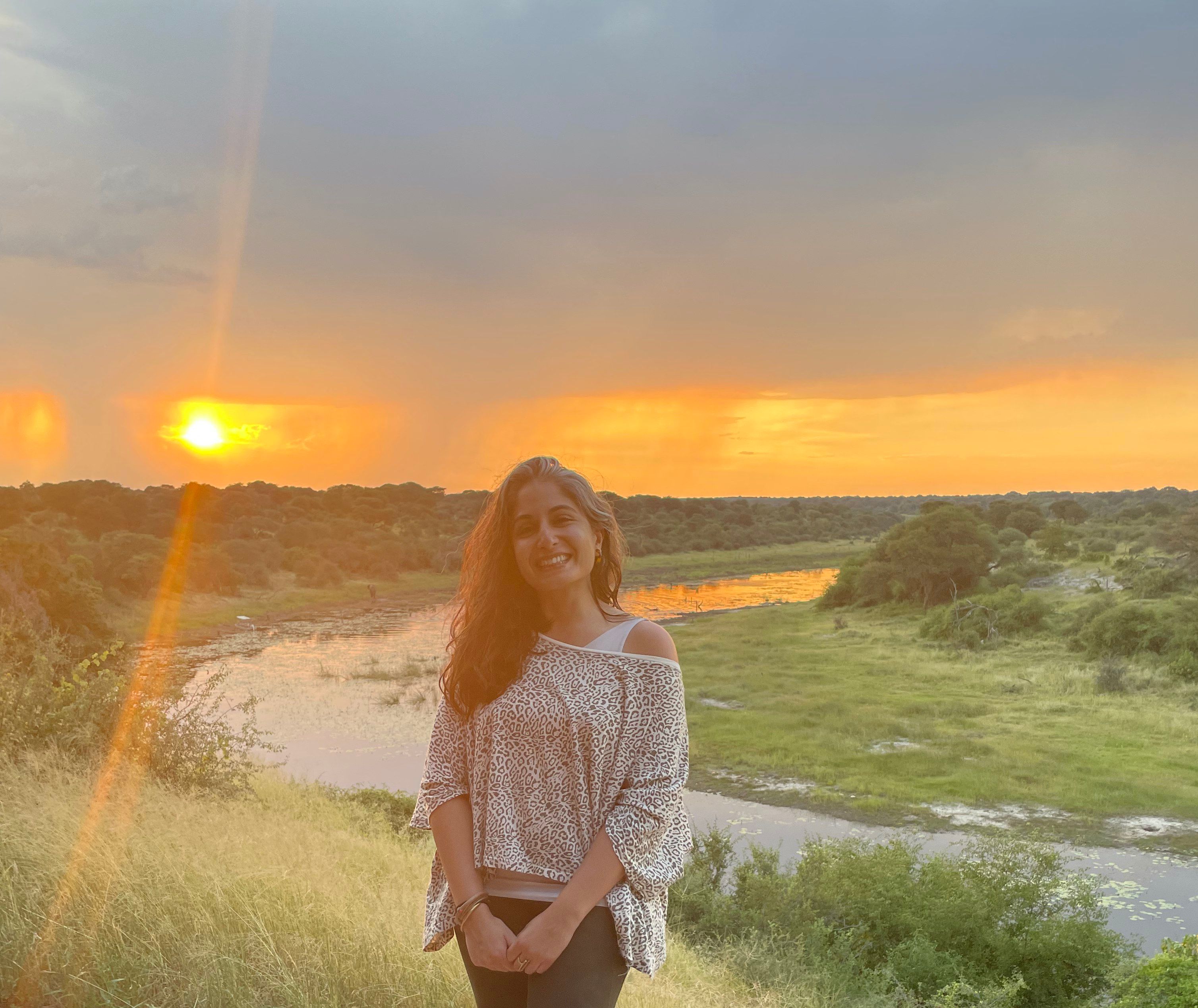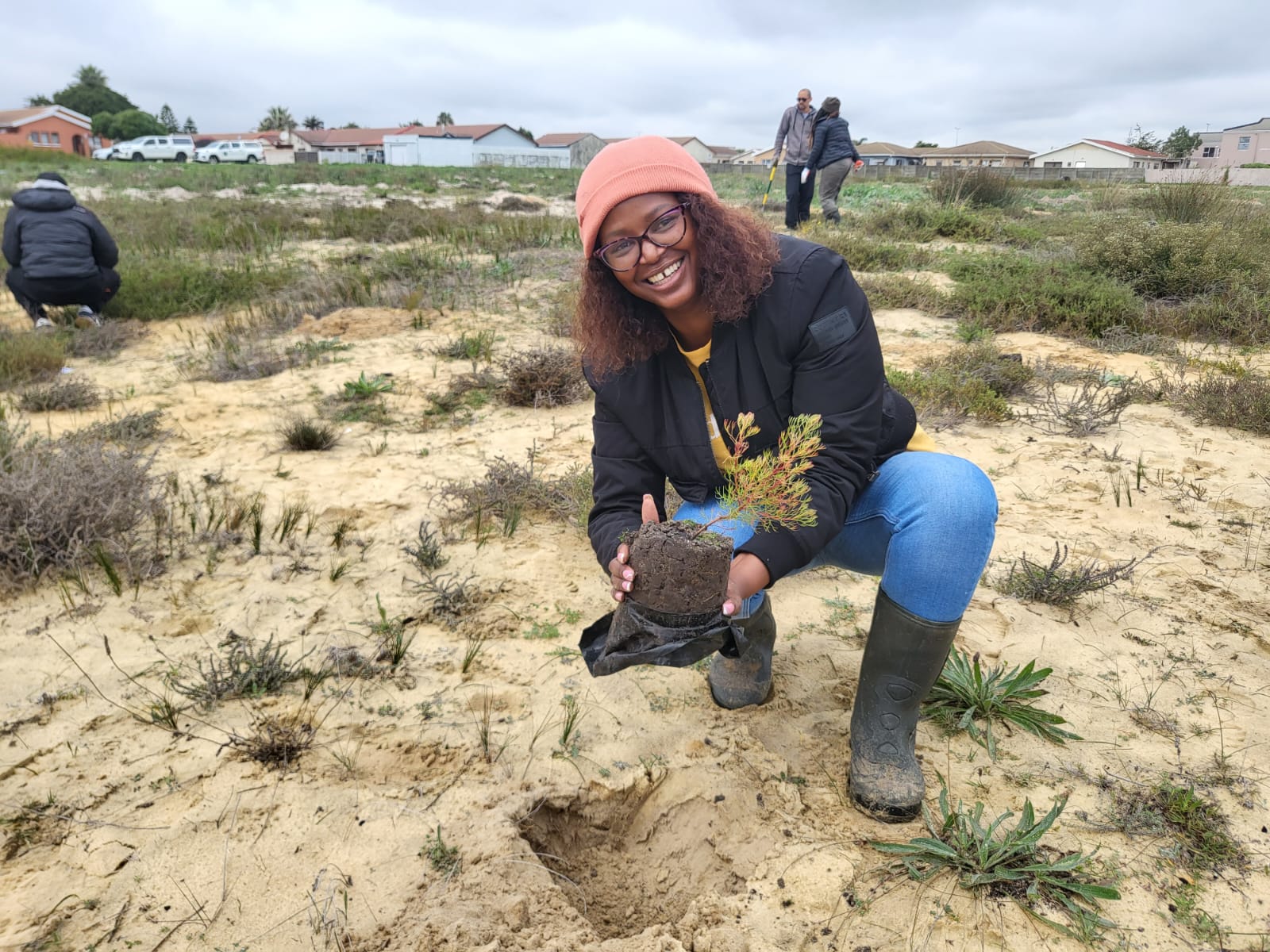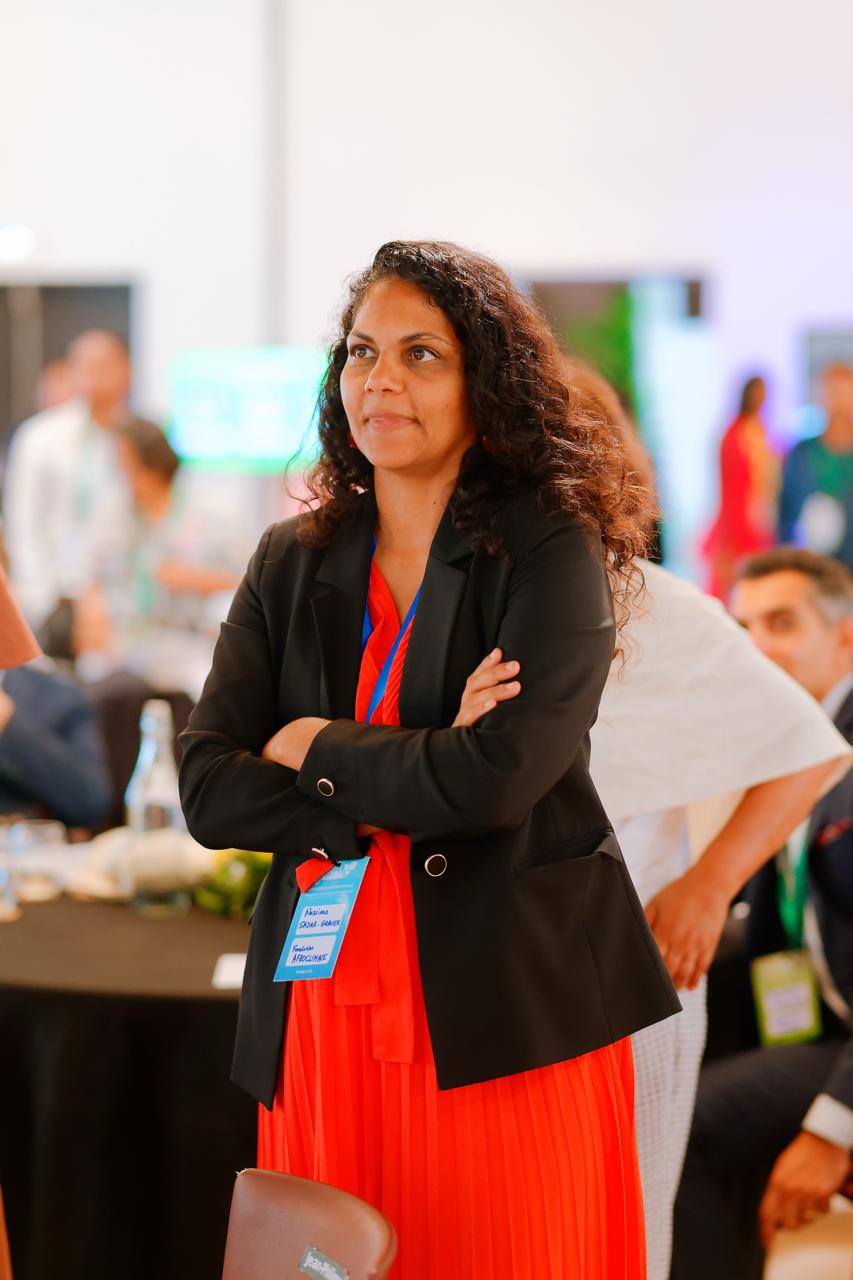So much knowledge and insight can come from recognising and learning from our failures, but we don’t talk about it enough.
With a rich cultural heritage, a life spent on multiple continents and a career spanning diverse sectors, Nafeesa Esmail is anything but conventional. And while this may be unsettling for many, Nafeesa celebrates her unbelonging. It has allowed her to listen to and empathise with diverse perspectives that often go unheard.
Today, Nafeesa is an interdisciplinary conservation scientist passionate about finding innovative win-win solutions for nature and people, ensuring local communities, stakeholders, and partners are at the heart of any collaboration. She is especially interested in unlocking entrepreneurial opportunities for sustainable and effective conservation strategies.
The Women for the Environment 2022 Fellow shares insights from her journey with Damaris Agweyu.

Nafeesa, which Earth element do you resonate with most?
I feel calmest in and around water. And like water, I am very flexible and adaptive by nature. I've recognised that professionally, this has enabled me to work with different kinds of people and institutions.
That said, I've always felt a very strong fire and frustration within. I think some of this came from the painful loss of my mum when I was young. As I’ve found my own path in a career I love, my fire is fueled by environmental destruction and societal injustice.
Over the years, I've embraced my life's fluidity, and that paradoxically has kept me grounded.
What did you want to be when you grew up?
I remember my teachers asking me this question when I was five; my answer was: a big sister. I have an older sister who I adore. She's always been such a strong presence in my life, and I wanted to emulate that. I recently shared this story with my young mentee from Kenya because she had told me I was like a big sister to her. And that's been very special.
When I finally understood this question, I knew I wanted to work with animals but didn’t know how. I was about seven or eight, and my dad took me, my siblings and my cousins to the Maasai Mara to witness the migration – that’s where I fell in love with wildlife and that landscape. I remember visiting SeaWorld and thinking maybe I could be a whale trainer!
Today, you are an interdisciplinary conservation scientist doing many different things in the sector. How did you get here?
I was born in Nairobi, and growing up, my family moved back and forth between Canada and East Africa. My favourite courses in high school were biology and art. And I thought I wanted to pursue a career as a wildlife veterinarian.
One summer, I found an internship placement with the Jane Goodall Institute in Uganda. I hadn’t even finished my undergraduate degree, but they asked me to support knowledge sharing with the field guides in Budongo Forest. I learned more from these guides than I could ever teach them. I also gained an understanding of the challenges faced by the communities living in and around the forest. Their biggest issue was reconciling their livelihood needs with the needs of conservation. They depended on firewood to cook their food. And we were telling them not to cut down the trees. It didn't feel right. This is when things shifted for me. I could follow the path of a wildlife veterinarian and have an impact on an individual scale or support conservation and potentially have a greater impact by working towards mitigating these more complex, systemic and wicked challenges.
That was 15 years ago. And it was then that my aspirations turned towards supporting community-led or human-centred solutions for conservation.
The other thing I’m passionate about is financing mechanisms for conservation. How do we change the broken conservation system that relies on short-term donor and funding cycles, which desperately need to be more sustainable?
Today, I primarily work for a Canadian-based organisation, the Wilder Institute as a researcher in an incredibly supportive team and work environment which provides the space to further explore and address these issues from different angles, including at the global policy level. I am also in the early stages of developing a shade-grown coffee venture in Uganda with a dream to one day re-wild my family’s agricultural estate.
With my unconventional working arrangement, not belonging wholly to any one organisation, I have found the balance and flexibility I need to thrive wholeheartedly as an individual. It mirrors my multi-faced identity. I've reconciled that with my unconventional nature, I don't (and just can’t) belong in only one place.
What solutions would you prescribe for what you've called a "broken conservation system"?
One of the values of wearing multiple hats is it forces you to see things from different perspectives. I believe one of conservation’s shortfalls is that so many organisations work in silos but with overlapping mandates. Much of the work is tied to a particular organisation and their missions rather than collective action for nature as a whole. I believe the future of conservation is collaboration.
But there are a lot of egos involved in conservation. What we're trying to do with WE Africa is a step in the right direction—shaping leaders to embrace more compassionate and wholehearted mindsets. Moving away from who you are and the organisation you're with to what you believe in and value.
Then there's the issue of financing. Conservation is overly dependent on a donor-funded system which is unsustainable in many aspects. It can be so restrictive and time-bound that its actions are often too short-sighted and short-lived to make a real difference. It can be inefficient, moving through so many hands before reaching where it needs to be. What if we were to shift conservation finance more through an enterprise approach? We do still need donor funding, but the way it works needs to change.
Corporations are now really recognising nature's value and are investing heavily in conservation and the environment. We could ride that wave. But we need to operate more efficiently. There's so much value in learning how the business sector operates. We don’t have time not to. A dream scenario, but if all conservationists around the world, regardless of their institution, band together and were efficiently organised into departments, each relating to different streams of work with transparency and accountability, we might have a chance.
Our actions have impacts, and one of the most heartbreaking is the impact on the local communities involved. More often than not, NGOs go into communities for a short period and impose something that's not locally accepted or sustainable in the long term. It creates dependency, or the interventions just don’t work. The result is the same. Communities don't get ownership. They don't find autonomy. They are not supported to sustain the programmes and fall back into poverty. Much of our conservation work should be about sustainable development because you're working with people, but that’s a different skill set altogether and generally not taught in conservation degree programmes, many of which are still ecologically focused.
And how is it that, most of all, the conservation research (or that which gets published) in Africa is led by non-Africans? That’s just not right. More attention is being drawn to helicopter science, and there are signals of shifting power dynamics, but Africans and their institutions need to be ready to move into these spaces and own them.
One of the other things I've been doing for many years is horizon scanning. It's a foresight technique using expert elicitation to look to the future, tease out, and prioritise emerging challenges and opportunities. The idea is that if we raise more attention to these issues, we can move away from firefighting and crisis management, which, in my mind, is another shortfall in our sector. We are often not proactive enough – we don’t harness new advancements or deal with problems when they're small. We wait until they are huge and unmanageable. But to even start thinking about this, you need to be open-minded, and people from different walks of life, with diverse expertise and backgrounds, need to want to work with you.
Tell me more about reconciling with your unbelonging.
One thing that keeps coming up is the complexity of my life. Answering questions about who I am, where I am from and what I do are difficult because I can't be put into a neat little box; to me, it’s never a one-word answer. And often, when I do give a one-word answer, no matter what that is, people are unsatisfied. I’ve struggled with this since I was young, but I now embrace my global citizenship.
I recognise that there are different forms of belonging. There is belonging to a place, and I've felt a strong connection to several places. I have felt as much at home in Spain with my broken Spanish as in Zanzibar with my broken Swahili. Canada has always been a place of safety and sanctity for my family. Kenya is where my parents and I were born, so I feel deeply rooted there. It’s where my heart will always be.
Then there is belonging to a race, culture, or religion, which aren’t always the same. I'm brown-skinned, and while my heritage is of Indian and Persian descent I have no connection or family there. I am a Shia Ismaili Muslim, which also comes with its own unique sense of community and identity.
I’ve lived and worked in over a dozen places and moved homes more times than I can count. My sister always used to tell me that home is where your family is. I've always wanted to believe her but only really felt that in the last few years. When I am with my family, who I am very close with, I really do feel like I am home.
But then, regarding professional belonging, I’ve often felt I don’t quite fit in just one place. More so, in between or at the border of two. I lived and worked in the UK for several years, and this is also where I received my Masters, but my thinking was either too Canadian or too African. Over the years, I’ve worked in different parts of Southern and Eastern Africa, and at times felt too Canadian and not accepted. With Canadian colleagues, I’m too African.
Has being unconventional been an asset or a liability?
This has come with a lot of challenges but a lot of blessings too.
Throughout my career, I’ve worked in all kinds of roles and settings – the private sector, academia, NGO, government, and on different topics of conservation, but somehow managed to adapt quickly to all of them. I’ve actually been called a mongrel for jumping around so much. But mongrels are the most resilient, right? In my work, I’ve led several collaborative research projects with people from different disciplines and with different lived experiences. Ensuring everyone's voices are integrated and heard is paramount, and this comes easily to me. I’ve realised that my multicultural background has shaped me to be mindful of, respect and honour people's different classes, cultures, nationalities and different world views.
Growing up in Canada, I was one of only two people of colour in my class in elementary school. For special occasions like weddings, it is tradition to put henna on our hands, but the kids would laugh at me when I showed up to school with it on. They called me diseased. I began to stop putting henna on, even though I loved that bit of my culture. I think I forsook a lot of my Indian traditions because of the teasing I got as a child growing up in a very white-dominated neighbourhood. Things have considerably changed since, but it was tough in the 90s.
In Uganda, where I’ve spent many years, both as a child and as an adult, people often assume I must be Indian and Hindu just because of my skin colour. It’s also such an overtly patriarchal society, so as a woman, your word means very little compared to a man’s. It’s obviously not unconventional to be a woman, but in many places, it is unconventional to be a woman of colour in a high-level position. And that has got to change.
My story is complicated, and I’m not always up to telling it. It is so painful to feel judged on every aspect of my identity because all kinds of connotations come with it. It’s exhausting.
How has the WE Africa journey impacted you?
WE Africa is a beautiful space that allows for deep connections with others who share the same love for nature and many of the same obstacles.
Before I joined, I was ready to quit conservation. I had left an organisation that was extremely toxic and racist. I felt lost. And I lost my fire. Conservation had become such a strong part of my identity. At the same time, I had just got COVID. Everything felt difficult. And then, I came across Colleen Begg's article in Mongabay about unbelonging and racism in conservation. It felt like the universe was sending me a sign. I had never met her, but I reached out, and she responded immediately with such warmth. She told me I was not alone and that the programme was exactly what I needed.
WE Africa supported my journey of owning my complex, diverse self and feeling seen for who I am. It has provided a valuable touchstone and a sense of professional belonging I didn’t think could exist. It's also poked at many deeply personal issues, allowing me to recover and grow in more ways than one.
What is your definition of success?
I think success comes from reflecting and learning. Whether you meet your targets or not, there is always something to learn. To me, true success is more about the learning than the outcome.
So much knowledge and insight can come from recognising and learning from our failures, but we don’t talk about it enough – maybe we all just need a little more vulnerability and courage.
***
This interview is part of a series profiling the stories of the 2022 WE Africa leadership programme fellows, African women in the environmental conservation sector who are showing up with a strong back, soft front, and wild heart.




